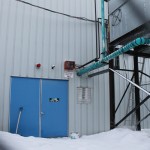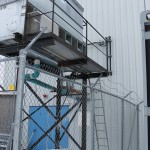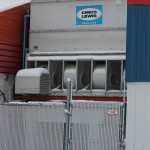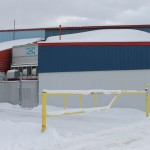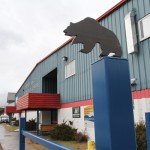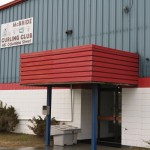By Korie Marshall
When was the last time someone died in BC because of ammonia? Lou Roussinos says we should look at it from another perspective.
“How many people do you want to kill before you do something?”
Since 1972 Roussinos has worked with the BC Safety Authority and was the chief inspector for boiler pressure vessels and refrigeration in 1996. That is when the province celebrated 100 years of safety for the industry.
“We started doing regulatory work and safety inspections in 1896 because of an accident that happened in False Creek,” said Roussinos. “The industry used to kill about 420 people a year.”
He says 1986 was the lowest number of deaths in Canada in nearly 100 years.
“Now it’s going back the other way again.”
In 1997 he left the boiler branch and went private because of what he considers the reduction of safety with respect to boilers. He says it started in the 1980’s with the mentality of “do more with less.” He started his own company, TFM Consultants International, to do exactly what he thought the government should be doing – audits on behalf of plant owners, to make sure their plants are safe.
“With safety, doing more with less is not possible,” says Roussinos. “It is a long way back to 1896, but we are walking backwards into the future. There is no coverage on your story in McBride because no one got killed. What if someone gets killed? Are we going to be able to bring that person back?”
On Jan. 24th, an ammonia leak from the cooling plant at the Robson Valley Recreation Centre in McBride caused the evacuation of 130 residents. Ammonia is a deadly gas – that is 130 people who could have lost their lives, says Roussinos. A WorkSafe BC manual explains the liquid ammonia used in cooling plants should not be confused with the “liquid ammonia” commonly found as a household cleaner. Household ammonia is actually a diluted mixture of ammonia and water. The ammonia used in refrigeration systems is a gas that has been compressed into a liquid, sometimes referred to as anhydrous ammonia. It turns to gas at -33 degrees Celsius, and can be explosive.
Changes to the Criminal Code in Canada, called the Westray Act, mean the people who operate the arenas are criminally responsible if a person dies. The amendment finally became law in 2004, years after 26 men died in the Westray mine explosion in 1993.
“It is a serious crime to allow employees to run a plant in an unsafe condition,” he says.
But no one cares, he says. Big news outlets haven’t covered the story, and it is almost forgotten already. And for the politicians, safety in most instances is just lip service to the public, Roussinos says.
“The inspector is the eyes and ears of safety,” he says.
He says the BC Safety Authority inspectors don’t come once a year as they used to; it might be once every 5-7 years, or sometimes never. He says there is no outcry from the public, because if the inspector doesn’t show up, there is less work to do.
Kelly Moon, spokesperson for the Safety Authority, confirmed that a safety officer has been on site at the Robson Valley Recreation Centre and the investigation is ongoing. She says reports from the investigation would typically contain private information, and are not prepared for publication, but if public safety concerns were identified they would be communicated as needed.
Moon says inspections are scheduled based on a number of factors, including when regulated equipment is installed and replaced, but she confirmed the last inspection for the centre was performed on March 28th, 2014.
In mid-January, before the incident in McBride, Tony Scholl, Provincial Safety Manager for the Safety Authority sent out a letter to plant owners, users and contractors about the hazards of ammonia, and the 16 ammonia leaks reported in the province since 2011.
“You can see the trend, and it is probably the tip of the iceberg because many municipalities do not report incidents,” says Roussinos. He thinks incidents are often not reported because of fears of the penalties by provincial regulations or by insurance companies.
So is there better technology? One way to move forward is to eliminate ammonia from public assembly places like arenas and curling rinks, says Roussinos, as has been done already in many states. Freon and carbon dioxide are the safe alternatives, he says, but the capital is often not there to change to the newer technology.
“The next option is to have well educated and trained people operating the facilities and well trained and educated people doing inspections on a regular basis.”
Roussinos thinks Scholl has his hands full. He alleges that since 2000 staff and inspectors have been reduced. At least we have a regulatory authority here in BC, he adds. Many provinces don’t.
A news release from the Regional District of Fraser-Fort George on Jan. 29th says that with restrictions on CFC’s, commonly known by the brand name Freon, ammonia has become a commonly used commercial refrigerant. Both the Canoe Valley and Robson Valley Recreation Centres use ammonia refrigeration systems. The Regional District says staff is well trained in the operation of the ice plants which are regularly inspected by the Safety Authority.
The Regional District says they received notification of an ammonia alarm in the early morning of Jan. 24th. “A significant ammonia leak on the outside of the building” was discovered by the McBride District Volunteer Fire Department. The Fire Department immediately initiated an evacuation of homes in the vicinity and the Emergency Operations Centre was activated out of the McBride Fire Hall.
CIMCO, the Regional District’s ice plant contractor was dispatched from Edmonton, and was onsite by 9:00 am. The leak was contained, repaired, and the ice plant was operational again by 9:00 pm Saturday evening, says the news release.
The Regional District says the leak was caused by an unusual accumulation of snow and ice, exacerbated by rain, which caused a buildup of weight on a pressure relief valve from the ice plant. The weight caused the pressure relief valve pipe to bend and rupture, allowing the release of ammonia to the atmosphere. The Regional District says the system has been repaired and the relief valves relocated so that the incident cannot be repeated.
“The Regional District sincerely regrets this incident that caused the evacuation of homes in McBride in the middle of the night. This has never happened before and is not anticipated to occur again,” says the news release.
An online newsletter from the Safety Authority lists the top three issues they are finding with boiler pressure vessels. Top of the list is maintenance of refrigeration systems. The Canadian Standards Association’s B52 standards for refrigeration specifies mandatory minimum maintenance requirements. Many of these requirements are not being followed. Number two is the proper installation of a manually operated remote shutdown switch. Third on the list is a properly installed drain valve on heating boilers.
Jordan Werzinski is an environmental consultant in California who shares some of Roussinos’ concerns. He says in California, ammonia systems are primarily used for agricultural cold storage and fertilization, but his home city does have an ammonia refrigerated ice rink, and workers at a meat processing facility hear him were recently hospitalized because of ammonia exposure.
“Ammonia is, without doubt, a dangerous chemical and deserves respect,” says Werzinski. But he believes with proper attention to design and maintenance, an ammonia system presents a relatively small risk to the surrounding community. He says compared to other hazardous chemical a very high concentration of ammonia is required to cause serious injury, and with international efforts to phase out halocarbon refrigerants, many facilities are left with few workable choices besides ammonia. After all, “Ammonia is a natural chemical, and even the human body produces it in small amounts,” says Werzinski.
Roussinos says he volunteers his services to help bring plants into compliance on the condition that any issues found are fixed.
“That is my challenge to the mayors of Valemount and McBride.” He says he is not looking for more work, but he is passionate about safety.



